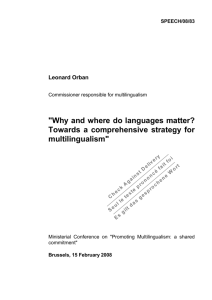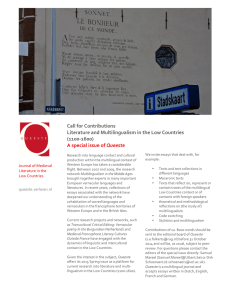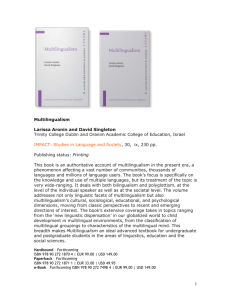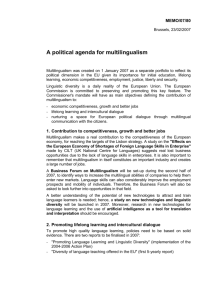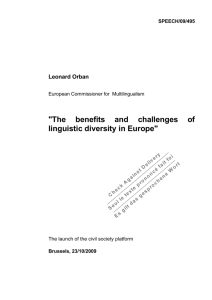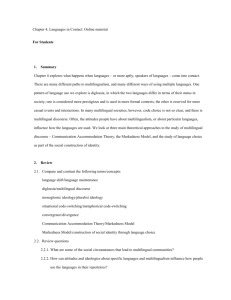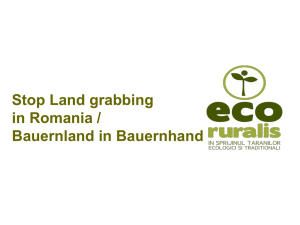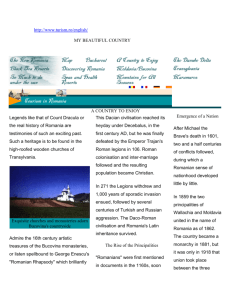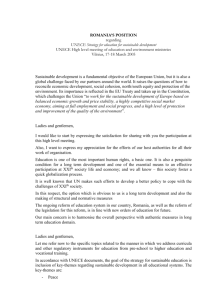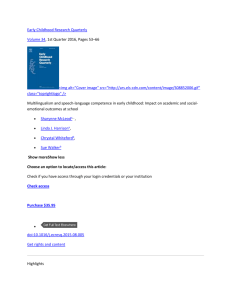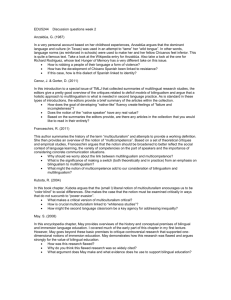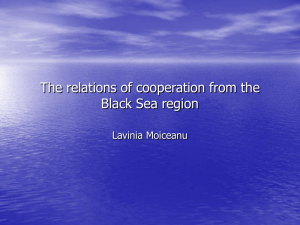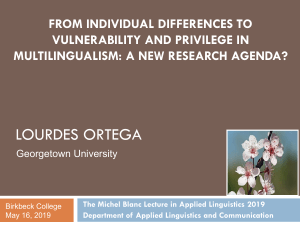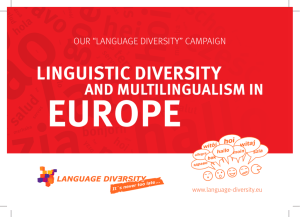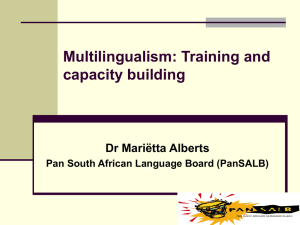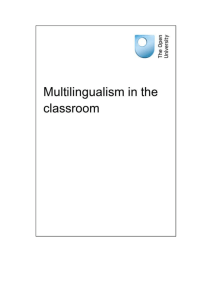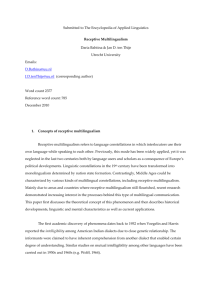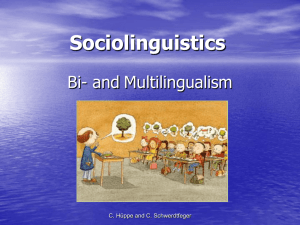DOC
advertisement
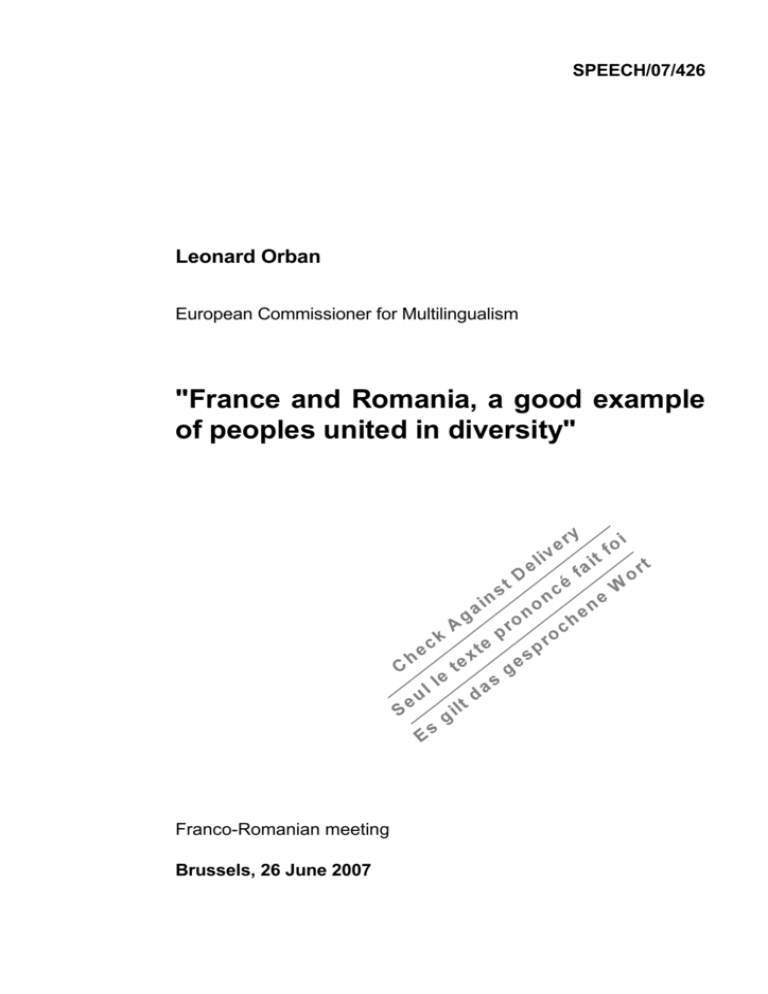
SPEECH/07/426 Leonard Orban European Commissioner for Multilingualism "France and Romania, a good example of peoples united in diversity" Franco-Romanian meeting Brussels, 26 June 2007 Mr Chairman, Mr Ambassador, dear friends, It is a great honour for me to take part in this Franco-Romanian meeting. My thanks to MEDEF and, in particular, the Chairman of the "Europe" Committee, Mr Bedier, who took the initiative of organising the event. Since 1946, MEDEF, formerly the CNPF, has become a major player on the French economic scene, with a mission to create a favourable environment for business. The European dimension has, of course, become ever more important to you. *** Please allow me at this juncture to talk to you in two capacities: as the Commissioner for Multilingualism, of course, but also as a Romanian. France and Romania have a long tradition of friendship and cooperation. Many young Romanians have, at school, at university or at home, experienced and appreciated French culture, literature, history and the French language…. And I know that, in France, Romania is also considered a close cousin in the East, a country whose Latin roots mean that any Frenchman can feel at home there. French television viewers are often surprised to hear Romanian journalists, politicians, athletes and other personalities speaking perfect French. In Romania, certain well-rooted organisations have fostered this French presence, for example the Institut français in Bucharest, our three cultural centres (Cluj-Napoca, Lasi and Timisoara), five Alliances françaises (in Brasov, Constantza, Craiova, Pitesti and Ploiesti) and the Lycée français "Anna de Noailles" in Bucharest. I am happy that this presence is a source of recognition and mutual understanding. As a Commissioner, I cannot help but be delighted by this merging of cultures, which is perfectly in keeping with the Commission's approach to culture, namely to draw the benefits from "unity in diversity". Our differences enrich us all. Let us also remember that 2008 will be, at the Commission's initiative, the European Year of Intercultural Dialogue. Beyond this community of culture, Franco-Romanian economic relations, already emphasised by previous speakers, are equally strong. France is one of Romania's main trading partners and, after Italy and Germany, it is the most important export market for Romanian businesses. And our links are still growing. Companies such as Renault, Michelin, Altstom, Gaz de France, Orange, Danone, Veolia Environnement, Carrefour and Accor are now important players in Romanian economic life. In this context, the recent accession of Romania to the European Union presents a real opportunity, offering access to the Community market and ensuring that our relations will continue to develop. That is the very purpose of our meeting today. *** As Commissioner for Multilingualism, may I just point out that, since the arrival or Mr Barroso as President of the European Commission, much has been achieved. And this detailed work which the Commission President has asked me to perform is not unrelated to our economic ambitions. In a few words, I would like to tell you why the Commission has made multilingualism a priority. Firstly, a person's language is part of his identity and culture, and respect for these two facets is fundamental to the Union. Moreover, speaking several languages is part of the daily life of many European citizens. I think that, as a general rule, learning languages helps us to better understand others and their way of thinking. 2 However, multilingualism is also important in the context of the Lisbon Strategy, the objective of which is to make us more competitive, to create more jobs and to provide better opportunities for all. For individuals, a knowledge of languages can offer career opportunities or open up the possibility of working abroad. For companies, a multilingual staff can provide access to European or even global markets. Languages are a way of making European companies more competitive. Since I became a Commissioner, I have endeavoured to define a policy for multilingualism for 2007, 2008 and beyond. To this end, I intend to base my work on the results of a study carried out for the Commission into the impact of poor language skills in companies on the European economy. This study emphasises that real trade opportunities have remained unexploited because of a lack of language skills in companies. A forum of businesses on multilingualism will be created in the second half of 2007 to look for ways of enhancing language skills in companies, so as to help them to break into new markets. I would also like to point out that, in 2003 the Commission launched the action plan on language learning and linguistic diversity for 2004-2006. A ministerial conference will be organised at the start of next year to discuss the progress made and the various areas for collaboration in the future. The Commission will be drafting a report on the implementation of the action plan in October of this year, in collaboration with the Member States. Moreover, a new communication on multilingualism will be proposed in late 2008, based on the results of the action plan and the contributions and suggestions from the Member States and interested parties. Finally, the Commission is going to set up a group of multilingualism experts and practitioners to make a contribution relating to multilingualism to the European Year of Intercultural Dialogue 2008. *** These are just some initiatives which give an idea of what the Commission is doing in this area. One of your greatest writers, Stendhal, said that "the first instrument of a people's genius is its language". I would like to conclude by asking you to support our efforts and to concentrate on developing even better language skills in your companies. And, of course, I wish you every success in forging economic links between France and Romania! 3
